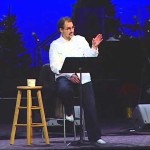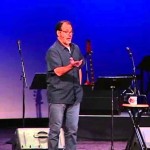We run our website the way we wished the whole internet worked: we provide high quality original content with no ads. We are funded solely by your direct support. Please consider supporting this project.
Open Theism Timeline
Open Theism Timeline by Tom Lukashow
An argument that is frequently raised against the open view is that it is a recent innovation. Paul Eddy had discovered Calcidius, a fifth century advocate, and I and others knew of L.D. McCabe and Billy Hibbard, two 19th century advocates. But that was about it – until I met Tom Lukashow.
Tom is a lawyer in Florida who has spent much of his spare time over the last thirty years researching the history of the open view. And what he has discovered is, at least to me, absolutely amazing! In preparation for the Open2013 Conference that will be held at Woodland Hills Church next week, I asked Tom if he could bring all his research together into one single annotated time line, and he has graciously obliged.
And now I share it with you. On this chart you will find that from 1642 up to the 1941, there has been a steady stream of scholars advocating the open view. I have not read all of these works, but those I have read– e.g. Fancourt (1720’s-30’s) Ramsey (1748), Bromley (1820), McCabe (1870’s), Brents (1874) and a few others – defend this view using many of the same arguments that advocates of openness today use. In fact, I’ve found in several of the works Tom has sent me several arguments I’ve not seen before. More importantly, this chart demonstrates that the open view is just about as old as Protestantism is! It can therefore no more be dismissed as an innovation than can Lutheranism, Calvinism or any other expression of the Protestant faith.
We should all tip our hats to Tom Lukashow. His tireless labor has done us all a tremendous service! Thank you Tom!
Category: Essays
Tags: Essay, Open Theism, Tom Lukashow, Woodland Hills Church
Topics: Open Theism
Related Reading

What is the significance of Judges 10:13–16?
The Israelites cry out to God because of their oppression from foreign rulers. The Lord refuses to deliver them because they have abandoned him (vs. 13–14). The Israelites repented, put away their foreign gods and worshipped the Lord. The Lord “also could no longer bear to see Israel suffer” (vs. 16). Hence the Lord changed…

A Brief Outline and Defense of the Open View
While many Christians have found the open view of the future to be the most helpful and accurate view of God’s foreknowledge of the future based on biblical, philosophical, and experiential evidence, others have criticized the view as unorthodox and even heretical. What follows is a brief description and defense of the open view prepared…

Reflecting on Open2013
T. C. Moore has posted some of his reflections from the Open Theism conference. T. C. was one of several people who pulled this conference together and he did a great job. He’s also incredibly smart and very active in the open view community. Also, he’s a young church planter in Boston and I’m sure he’s…

Does God Intervene?
The Open View of the future recognizes the vast influence of all the angelic and human wills God created, which, in turn, influences the various outcomes and circumstances in life. Therefore life is arbitrary because of the way the decisions made by an unfathomably vast multitude of free agents intersect with each other. How life…

Sermon Clip: Marshmallow Advent
In last weekend’s sermon, Greg tells us about Dietrich Bonhoeffer’s writings on advent, and how getting in touch with our emptiness through silence and solitude can lead to peace. This short clip explains advent and the advantages of delayed gratification. You can download the entire sermon as well as other sermon resources by visiting the…

Sermon Clip: Hijabs At The Gym
In the last message of Mixed Signals, we take a look at Islam and how Kingdom people should be responding to the growing worldwide Islamic movement. We explore the growing disparity between the life Jesus led and calls us into and the normal worldly response to those who are different or potentially threaten our way…
